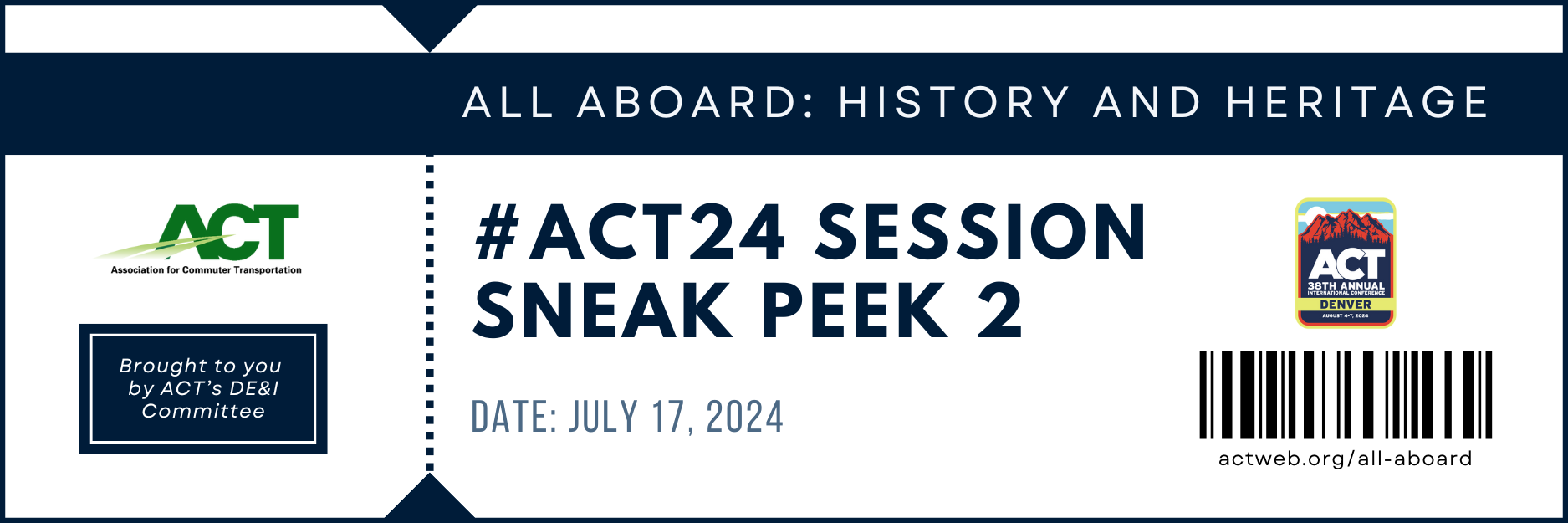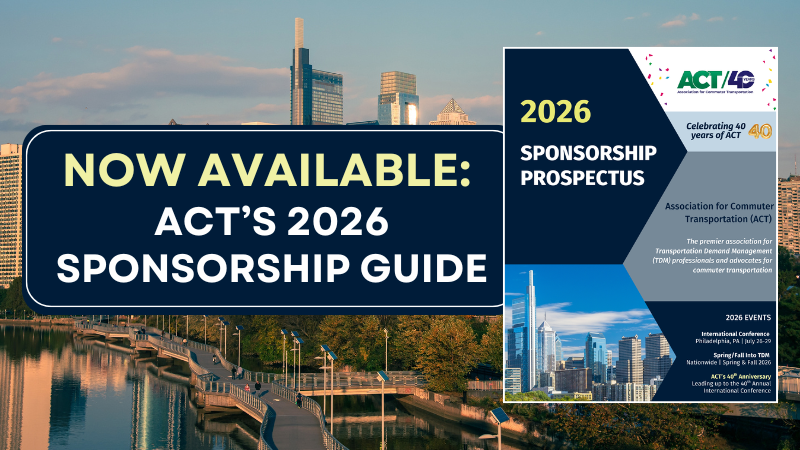All Aboard: Conference Session Sneak Peek 2

This spotlight is number two of three parts that will be published throughout the month of July. Stay tuned for the final sneak peek!
Welcome to All Aboard. Brought to you by the members of ACT’s DE&I Committee, this content strives to highlight people and their stories in a more holistic approach to show how these contributions move our industry forward.
This month, ACT’s DE&I Committee is giving you a sneak peek on a couple of conference sessions that highlight efforts to integrate DE&I in their projects. Let’s welcome to the blog Transportation Wallet: Access for All Program Coordinator Madeline Feig from the City of Portland Bureau of Transportation and Health Through Housing (HTH) Mobility Program Manager Nick Abel from King County Metro. They will be speakers for the Transportation Equity for Supported Housing and Income-Qualified Participants conference session.
What motivates you in your job?
Madeline: I’m motivated by the many strong partnerships we’ve built with community-based organizations in Portland. The Transportation Wallet: Access for All program would not be what it is today without these relationships and without the support of the hardworking and dedicated staff at each of our partner organizations. Despite budget and staffing limitations, these organizations are dedicated to providing high-quality, accessible, dignified services to low-income Portlanders and they continually inspire and inform our program to grow and adapt accordingly.
I’m also motivated by the direct impact of the Transportation Wallet program on the communities and individuals it serves. We’ve heard from Wallet recipients that having access to transportation and mobility services without the stress of cost can change the way they move through the city. They are more likely to try new modes such as bikeshare and e-scooters, replace car trips with transit, and feel empowered to make trips that otherwise would have been too time-consuming, inaccessible or expensive. These stories motivate me to push for continuous improvements in our program to better serve vulnerable individuals and communities.
Nick: Health Through Housing is such an incredible, interdisciplinarian model that brings essential services to residents with a holistic approach. I’m excited to play a small role in it. As a transportation professional with a background in TDM, I’m motivated by the opportunity to try innovative, new programs built to serve the needs of a marginalized community. I’ve had the privilege of looking at a huge need- improving access to transportation for individuals facing chronic homeliness- through a matrixed lens, short term projects and long-term programs, micro and macro community solutions. We’ve effectively rolled out a series of essential programs- fully subsidized transit passes, peer-to-peer educator onsite- really quickly, but also get to think about long term sustainability and scaling of our programs, so that when the HTH program grows or Metro chooses to expand our services to additional supportive housing sites, we have a plan.
And of course, I get immense motivation and satisfaction from knowing that the work I do is meaningful and has had a huge impact on some of our most vulnerable community members. I’ve had the opportunity recently to participate in onsite events and get to see the incredible relationships our navigators have created with residents, and hearing directly about how access to transit has improved because of our work gives me motivation to continue to innovate and expand our services.
Where should an agency/organization/business start in introducing DEI efforts?
Madeline: I’ve been lucky to join the Portland Bureau of Transportation, an agency that is working actively to acknowledge and dismantle the historical and current racism and inequity behind Portland’s city planning. Mobility and transportation are directly tied to health and economic outcomes in our communities, and the Transportation Wallet: Access for All program is just one of many resources that seeks to reduce transportation cost burdens for people living on low incomes in the Portland area. Agencies that are interested in starting similar programs should begin by framing their program goals in a historical context and identifying groups that are most in need of services, and should develop programs with the ongoing input of community members. Although the Transportation Wallet: Access for All is now a permanent City of Portland program, it has benefitted us to keep a “pilot mindset,” with openness and desire for consistent iteration and improvement based upon community feedback, partner organization input, and program evaluation. Community needs are constantly evolving, and DEI efforts should seek to adapt to these shifts in an ongoing manner.
Nick: This is a great question, and one I don’t feel totally qualified to answer. The easy answer is, everywhere. Introduce inclusive hiring practices, prioritize centering the voices of marginalized community’s voices in design and decision making, and ensure your organizations mission, values, and actions emphasize and prioritize inclusivity and equity. Without identifying and prioritizing these into the mission, an organization can’t effectively prioritize them.
A small practice at Metro I’ll highlight is starting every regularly scheduled meeting with an equity/social justice (ESJ) moment. We do this at every level- department, section and team meetings all make space for them in the agenda. We have a rotating schedule, so each meeting an individual or team brings a short ESJ moment topic for presentation and discussion. Sometimes they are relevant to an individual’s work, sometimes they are focused grounded in something we as society are honoring (Pride month, Black History Month, etc.) and sometimes the topical to current cultural events. This small practice has led to me learning so much.
How do you handle challenge or adversity?
Madeline: In the face of challenge or adversity, it can be helpful to go back to the origins of our work. What are the founding goals and values of our program, and how can we take small but consistent steps toward those goals, even in the context of setbacks? It can also be beneficial to reflect on the everyday wins we see throughout the year; these may be things that aren’t reflected in our program evaluation and reporting, such as anecdotal feedback from a community member, but they can serve to motivate us through challenging times. I’ve also found that community partnerships can be a valuable resource during times of adversity, as they can provide a sounding board and supportive insight based on similar struggles.
Nick: I’m fortunate to have a great team that’s supportive when things get difficult. My manager is an excellent problem solver who can help me understand issues and brainstorm different solution quickly. I’ve always found that communication is the best tool- if things aren’t working, you have to share that with the people who can help make it work better. HTH is a complex, multifaceted program with dozens of stakeholders. Sometimes it can be difficult to make sure messaging in consistent, and that the right people are well informed on what Metro is trying to do and how we would like to be supported. I believe patience and persistence is best.
What is the best advice you have heard or given in your career?
Madeline: The best advice I’ve been given in my career is to build partnerships with individuals and organizations who are already “doing the work.” At times we can be drawn to attempt to meet every community need and solve every problem, but there are often groups who are well-established in the space who may be better equipped to address these issues, or with whom we can partner to support existing efforts. Our programs don’t need to do everything; they need to serve their intended purposes effectively.
Nick: I previously worked as a therapist and feel like a lot of the advice I received from supervisors is applicable in so many parts of my professional and personal life. I had a supervisor who told me once that his philosophical approach to therapy is that “everyone is doing the best that they can do in this moment”. When we meet people where they are, we recognize them for the effort they are giving, which is immensely important. Life (and work) is difficult, and people need to feel seen and validated in order to grow.
I also think this is an excellent philosophy to apply to TDM. Behaviour change is hard, and as transportation professionals it's easy for us to forget that we live in a country that is automobile-centric, and so patience and validation goes a long way with people who are interested in changing their transportation choice but are hesitant to try something.
Why should a conference attendee listen to the Transportation Equity for Supported Housing and Income-Qualified Participant conference session?
Transportation is a human right, and municipalities need to better about building systems and programs that are design for the inclusion of communities with different mobility capabilities and needs.Check out there session to learn about:
-
Innovative programs designed to improve the access to and affordability of transportation for marginalized communities.
-
The concept of Universal Basic Mobility, which stems from the belief that it should be easier for everyone to meet their daily transportation needs to get to school, work, medical appointments, get food and basic services, and spend time with friends and family.
-
Transportation benefit programs such as the Transportation Wallet and other Universal Basic Mobility pilots can be replicated fairly easily in other cities and can help fill gaps in existing services
-
Lessons we’ve learned over our pilot years and through our establishment as a permanent City program.
Register for the conference
If you have not registered for the conference, please visit: https://www.actweb.org/events/38th-annual-international-conference
Plan your conference schedule
If you would like to see the schedule and plan your sessions, please visit: https://www.actweb.org/international-conference-schedule
Join the DE&I committee!
If you would like to be part of the DE&I committee, please contact Jonathan Schuppert at jschuppert@meta.com. There will also be an information table set up at the conference if you would like to speak with someone in person.
See you at the conference!

